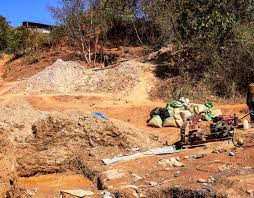
RIVERBED mining continues unchecked in Manicaland, despite a government-imposed ban, with high-ranking Zanu PF officials and security forces allegedly leading the environmental destruction just three weeks after the state reissued the prohibition.
James Mupfumi, director of the Centre for Research and Development (CRD), said riverbed mining has intensified since the ban.
“It (riverbed mining) is continuing; It’s lawlessness. They are not accountable to anyone. They are not accountable to the government. It is benefitting individuals,” he said.
“It is also happening in Chimanimani. It is happening in Odzi. In Chimanimani, the mining is taking place under the banner of a company (named supplied), which is (allegedly) affiliated to the military. We don’t know where the proceeds are going.”
However, the chairperson of the chrome sector in the Zimbabwe Miners Federation, Tafirei Masuma, said the named military firm was not involved in riverbed mining.
He insisted that the company was rehabilitating land and rivers damaged by previous mechanised riverbed mining operations.
“The said military company was never doing riverbed mining,” Masuma told the Zimbabwe Independent in an interview.
“It was rehabilitating damaged portions of rivers in Manicaland under the guidance of the Environmental Management Agency (Ema).
- Veld fire management strategies for 2022
- Stop harassing media for reporting truth
- Veld fire management strategies for 2022
- News in depth: Mnangagwa’s push for $12 billion mining industry imperils communities
Keep Reading
“They were doing it perfectly in line with the requirements of Ema. It never defied the law. It will never defy instructions of the government because it is also a state institution.”
Masuma, however, said illegal mining was rampant in Manicaland but maintained that the said military company’s activities were lawful.
The recent riverbed mining ban was the second in a decade after government failed to enforce prohibitions made in 2020.
Authorities realised the dangers of mechanised riverbeds mining, especially by Chinese-run firms. Despite the ban, advanced equipment continues to devastate Zimbabwe's rivers worse than what the 1,5 million artisanal miners are often accused of, sources said.
The sources told the Independent that the most affected rivers in Manicaland include Odzi and Mutare, which have become hotspots of environmental degradation. Civil society organisations monitoring the situation say the destruction is equally severe in Chimanimani.
Mupfumi blamed politically connected individuals and alleged security sector-linked entities for perpetuating the illegal mining.
“We expected that after the ban there was going to be a stop and also that there would be measures in place for rehabilitation,” he said.
“But there is nothing like that. The major concern is the issue of opacity. These are cartels which are protected by political elites.
“There are names of people who are exploiting special grants. We have the names. Third parties are showing up claiming that they have been subcontracted to mine by the original holders of the special grants,” Mupfumi said.
The revelations underscore the scale of Zimbabwe's illicit gold mining activities, where cartels are reportedly smuggling around US$1,5 billion worth of gold annually.
A 2022 Al Jazeera documentary highlighted the involvement of politically connected figures in gold looting.
Farai Maguwu, executive director of the Centre for Natural Resource Governance (CNRG), echoed Mupfumi's concerns, saying the ban had done little to stop illegal mining.
Pronouncing directives without enforcing them was futile, he added.
“It is indeed continuing,” Maguwu said.
“In areas such as Penhalonga, we have seen an increase. Small-scale miners have arrived in the area with their equipment. They are digging near the river. Nothing has abated.
“There is a need for political will to address the problem. Now, if the senior politicians are benefiting from the environmental carnage that is taking place, it means those Cabinet decisions would merely be rhetoric. We need political will, commitment, and seriousness,” he added.
Zanu PF’s director of information, Farai Marapira, dismissed allegations that ruling party members were fuelling illegal mining.
“As Zanu PF, we do not place ourselves above the law,” Marapira told the Independent.
“We follow the laws of the land to the letter. Any talk of Zanu PF members acting outside of the parameters of the law is untrue and cannot be countenanced because we are very disciplined and regimented.”
“Be that as it may, I would like to encourage members of the public with regards to this issue and any other legal issue that may arise out of our day-to-day living; it must always be within the ambit of the law. Everyone is equal before the law. Everyone is subject to the law,” Marapira said.
“And anyone who breaks the law shall feel its full wrath regardless of affiliation, religion, age or any other factors.”
Lands, Agriculture, Fisheries, Water and Rural Development permanent secretary Obert Jiri, who announced the ban, said the ministry had not received reports of the illegal mining activities in Manicaland.
“I have not heard the reports. What was announced is what we implement. It (implementation of laws to enforce the Cabinet directive) is in progress,” he said.
The Zimbabwe National Army’s acting chief of staff Brigadier-General Zitterson Gideon Sabeka asked for questions in writing after agreeing to meet at Zimbabwe Defence House.
“The protocol is that you submit to us your questions in writing on a company letterhead,” he said late yesterday afternoon.






